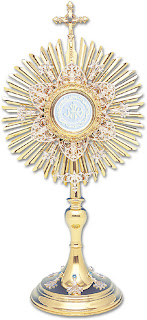"The pastor, or laypersons at the direction of the pastor, may distribute the consecrated bread and cup to sick or homebound persons as soon as feasible following a service of Word and Table as an extension of that service. When this service is used as a distribution of the consecrated bread and cup, the Great Thanksgiving is omitted, but thanks should be given after the bread and cup are received."
Now, I had to ask a question, because I happen to know that this was a topic of debate at the 2008 General Conference of the United Methodist Church. I realize that makes me a huge nerd, but here's why I know that: my dad was a part of that discussion and was texting me as the conversation was unfolding. I was his sort of "phone-a-friend" resource, and he had me look up Article 16 in the Articles of Religion (which are a pretty standard marker of how Protestant theology differs from Catholic theology, and which John Wesley adapted and adopted for Methodists). Here's the relevant section:
"The Sacraments were not ordained of Christ to be gazed upon, or to be carried about; but that we should duly use them."
When I brought this up, the professor pointed out that this article was written
 as a response to the Catholic doctrine of transubstantiation (which basically means the bread and wine literally become the body and blood of Christ). Catholic practices of adoration (worshipping/praying before the consecrated host), processing the Host in a monstrance (a really pretty display case for the Jesus cookie), Corpus Christi processions, etc., were unsavory to the early Protestants and remain so (except to some Anglicans...which is another story). Article 16 was meant to avoid magical associations made with the Eucharist ("This is my body" in Latin--hoc est corpus meum--became "hocus pocus"), not to keep Aunt Betty from participating in Holy Communion.
as a response to the Catholic doctrine of transubstantiation (which basically means the bread and wine literally become the body and blood of Christ). Catholic practices of adoration (worshipping/praying before the consecrated host), processing the Host in a monstrance (a really pretty display case for the Jesus cookie), Corpus Christi processions, etc., were unsavory to the early Protestants and remain so (except to some Anglicans...which is another story). Article 16 was meant to avoid magical associations made with the Eucharist ("This is my body" in Latin--hoc est corpus meum--became "hocus pocus"), not to keep Aunt Betty from participating in Holy Communion.Fair point. However, I took issue with the professor's comment that the people at General Conference who debated this issue had forgotten CH13 (our intro church history course here at Duke). I didn't bother mentioning my dad's participation in the discussion with his M.Div. and Ph.D.--but this is my blog, so I can mention it here. :)
OK, so what, I may not agree with my professor entirely. But it did bring up an interesting consideration for me. Is the act of taking blessed bread and wine (er, grape juice) intended to incorporate the sick and homebound into the communal nature of the sacrament? I assume the alternative to bringing the elements to a person is to do the Great Thanksgiving with unconsecrated bread and juice. But should private communion services like that be avoided?
Maybe no one else cares about this, but I used to read liturgical theology for fun, so I do. :)

0 comments:
Post a Comment